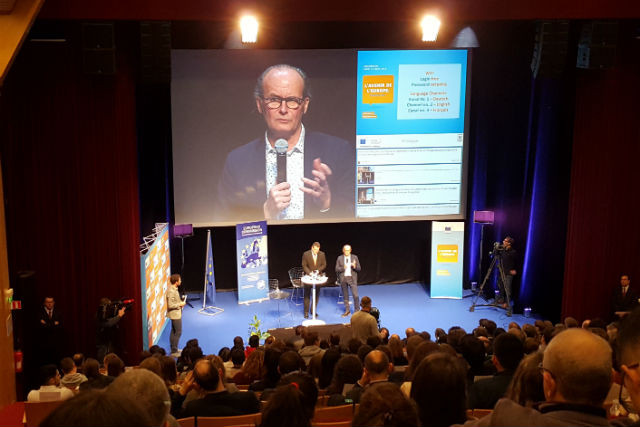Luxembourg MEP Claude Turmes joined European Commission energy vice president Maroš Šefčovič in front of a packed audience at the Salle Robert Krieps at Abbaye de Neimënster to outline the EU and Luxembourg’s future energy policy.
“Luxembourg is doing an experiment. It has a sharing solar mechanism where we would produce the solar electricity on your roof and share it with your neighbour who doesn’t have a good position or who rents and the owner isn’t willing to install photovoltaics,” Turmes explained. He stressed that it remained an experiment because “electricity, on the wholesale market, is dam cheap” and it remained to be seen how financially beneficial it would prove for people wishing to trade in energy.
Testing on national scale
Last year, secretary of state for economy Francine Closener revealed that half of electricity consumed by households was generated from renewable sources. In total, the country counted 6,500 photovoltaic installations, over triple the number in 2014, contributing to a fifth of total renewable energy generated by the country. New measures were rolled out in 2017 to further promote photovoltaic electricity generation, including grants of up to 20% for installations of 0-30kW and new feed in tariffs were introduced.
While similar schemes exist in in California, New York, the Netherlands and in Germany--where energy cooperatives generate up to 50% of renewable energy in local areas--Luxembourg “is one of the first countries to test it on a national scale,” Turmes explained.
He further said that the European Parliament was pushing for legislation to give all European citizens the right to generate their own electricity, a step which if approved, would force Spain to revoke their sun tax.
Growing battery market
The MEP said Europe needed to engage more in green tech innovation, not only to slow climate change and ensure clean air for citizens, but to compete in a rapidly growing industry and employment sector. Turmes stressed that “we need to move” to catch up with the green tech innovation emerging in places like California and China.
To demonstrate the market incentive, Šefčovič explained the market for green batteries for the clean energy mobility sector will be worth €250bn per year by 2020.
“Do we really want to share that money?” he said. In October 2017, he launched the European Battery Alliance to establish a value chain in Europe focused on green batteries.
“We need between 10 and 20 gigafactories in Europe to cover demand. We need €20bn investment to get to this. I don’t think it’s such a tremendous amount of money when looking at the budget and market created but we need to stimulate the market,” he said.
Luxembourg parliament discussions
This need for investment in green batteries found favour with Luxembourg MPs on Monday morning when Šefčovič addressed Luxembourg’s parliament. According to a press statement, MPs said that: “investing in research to create high-performance and affordable batteries for electric cars should also be a priority for the European Union and its member states.”
MPs also questioned the ambition of the commission’s 2030 climate targets, asked about cooperation mechanisms in EU member states and ways to speed up the deployment of electromobility around Europe. When questioned about the future of nuclear energy in Europe, Šefčovič said that “safety standards remain a priority for the Commission.”
